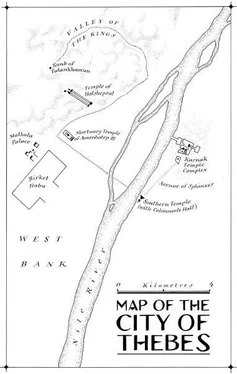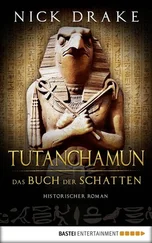Nick Drake - Tutankhamun - The Book of Shadows
Здесь есть возможность читать онлайн «Nick Drake - Tutankhamun - The Book of Shadows» весь текст электронной книги совершенно бесплатно (целиком полную версию без сокращений). В некоторых случаях можно слушать аудио, скачать через торрент в формате fb2 и присутствует краткое содержание. Жанр: Исторический детектив, на английском языке. Описание произведения, (предисловие) а так же отзывы посетителей доступны на портале библиотеки ЛибКат.
- Название:Tutankhamun: The Book of Shadows
- Автор:
- Жанр:
- Год:неизвестен
- ISBN:нет данных
- Рейтинг книги:4 / 5. Голосов: 1
-
Избранное:Добавить в избранное
- Отзывы:
-
Ваша оценка:
- 80
- 1
- 2
- 3
- 4
- 5
Tutankhamun: The Book of Shadows: краткое содержание, описание и аннотация
Предлагаем к чтению аннотацию, описание, краткое содержание или предисловие (зависит от того, что написал сам автор книги «Tutankhamun: The Book of Shadows»). Если вы не нашли необходимую информацию о книге — напишите в комментариях, мы постараемся отыскать её.
Tutankhamun: The Book of Shadows — читать онлайн бесплатно полную книгу (весь текст) целиком
Ниже представлен текст книги, разбитый по страницам. Система сохранения места последней прочитанной страницы, позволяет с удобством читать онлайн бесплатно книгу «Tutankhamun: The Book of Shadows», без необходимости каждый раз заново искать на чём Вы остановились. Поставьте закладку, и сможете в любой момент перейти на страницу, на которой закончили чтение.
Интервал:
Закладка:
He paused, and surveyed the councillors as if daring them to question this account of justice, and its punishments.
‘The Head of the city Medjay has persuaded me there will be no further public disturbances of this kind. I have taken his word on trust. His efficiency in the investigation of the unrest, and his discipline and commitment to arresting and executing those found guilty, have been exemplary. I only wish others laboured with the same alacrity. We hereby grant, in recognition of his achievement, a Gold Collar of Honour, as well as a doubling, with effect from this day, of the city Medjay budget under his command.’
Nebamun made his way through the admiring crowd, accepting the approbation and acclaim, the nods and the pats, until he stood before the gaunt old man, and bowed his head. As Ay lowered the collar on to my superior’s fat neck, I experienced a wish to march over and relieve him of it. For who here knew of the injustices and the cruelties he had perpetrated upon innocent people for the sake of this moment, and this gold? Disgust swirled in my stomach. He looked up, made the gestures of gratitude to Ay, the King and the Queen, and then made his way back to his cronies. As he did so, he sent me a cold nod of victory. I knew he would use this honour to make my life even more difficult.
Ay continued: ‘Order is everything. We have restored maat to the Two Lands. I will allow no rogue elements, no contending forces, to disturb the stability and security of our kingdom.’
He spoke as if, by the authority of his saying so, it would be so; and as if he alone was the arbiter of that order.
‘Therefore, let us turn now to the matter of the Hittite wars. We have received reports of successes in battle, with new territory won, and existing towns and commercial routes sustained and their security improved. We expect to receive Hittite terms of negotiation. The old enemy of the Two Lands is in retreat!’
There was a smattering of obsequious applause in response to this hollow claim. For everyone knew that the wars were far from won, and the battles with the Hittites, which were only the latest skirmishes in the endless friction in the borderlands and states that lay between the two kingdoms, could not be resolved so easily.
Ay continued: ‘If there are no further matters to be discussed with my esteemed friends and colleagues, we may retire to the banquet.’
He stared balefully at his audience. Silence reigned, and I saw that no one dared to contradict him.
Everyone prostrated themselves slowly and unconvincingly, like a bunch of elderly performing monkeys, as he, followed by Ankhesenamun and Tutankhamun, descended from the dais.
In the outer chamber, many trays had been set out on stands. Each one was piled with food: bread, rolls and cakes, all fresh from the bakery; roasted cuts of meat; roasted birds in thick glazes; roasted gourds and shallots; honeycomb; olives glistening in oil; fat bunches of dark grapes; figs, dates and almonds in astonishing abundance. All the good things of the land, heaped up in piles.
What followed was an instructive spectacle. For these men, who had never worked the soil under the midday sun or butchered an animal with their own hands, rushed to the stands as if they were the desperate victims of a famine. Showing no shame or manners, they elbowed each other aside, pushing and shoving to reach the fragrant mountains of good things of the banquet. Delicacies that must have taken a very long time to prepare fell from their heaped dishes, and were squashed underfoot. They were so greedy they helped themselves, rather than waiting to be served. Despite the somehow appalling quantities of food, of which most of the population could only dream, they behaved as if they were utterly terrified that there would not be enough. Or as if no matter how much was placed before them, somehow they were afraid it would never be enough .
Perhaps it was naive of me to compare the disgraceful luxury of this scene with the poverty, and the lack of water and meat and bread, that haunt the lives of those outside these privileged walls. But it was unavoidable. The noise reminded me of pigs at the trough. Meanwhile, as this feeding continued, the King and Queen, now seated on another dais, attended to a long queue of high officials and their retinues, each waiting to offer obsequious respects and to make their latest, no doubt self-serving, petitions.
Nakht joined me.
‘What a repulsive sight,’ I said. ‘The rich as they really are: it is like a moral fable of greed.’
‘It certainly does spoil one’s appetite,’ he agreed politely, although he seemed less revolted than I.
‘What did you make of Ay’s speech?’ I asked.
Nakht shook his head.
‘I thought it was quite appalling. It’s another travesty of justice. What a world we live in! But if nothing else it shows that even tyrants struggle to maintain their power, beyond a certain point. The truth is, a handful of executions won’t solve the overwhelming problems of this state. And although no one here would be caught dead saying so, everyone knows it. He’s bluffing, and that’s interesting because it means he’s in deep trouble.’
I caught a brief glimpse of Ay surrounded by courtiers; I saw the little drama of his arrogance and condescension, and their sycophantic, stuck, desperate smiles. Nebamun was with him, like a stupid dog gazing with adoration at its master. Ay saw us looking at him; he recorded the moment of information, and the expressions on our faces, in the cold tomb of his brain. He nodded at something Nebamun said, and the Medjay man then looked as if he was about to summon me over for the patronizing questioning I had been dreading.
But then, as the noise of the feasting and shouting and arguing reached its zenith, a sudden fanfare from a single long silver military trumpet silenced everyone; full mouths gaped open in surprise, quail and goose legs were stuck halfway from plate to mouth, and all turned to watch a lone young soldier march into the centre of the chamber. Ay seemed caught unawares. Something other than certainty glittered in his reptilian eyes. He had not been forewarned of this man’s arrival. A herald of the temple stepped forward and announced him as the messenger of Horemheb, General of the Armies of the Two Lands. The silence thickened.
The soldier made the correct prostrations and formulas of praise to Tutankhamun and Ankhesenamun. He did not acknowledge the presence of Ay, as if he did not even know who he was. He surveyed the now-silent chamber and its population of gourmands with the moral arrogance of youth, clearly disappointed by their venality. A touch of shame appeared in the faces of many of those still gorging themselves. Exquisite glazed pottery and carved stone dishes clattered lightly as they were quickly set down on the trays. The honoured councillors swallowed, wiped their fat lips, and cleaned their greasy fingers.
‘I have the honour to bear and to speak a message to the Great Council of Karnak, from Horemheb, General of the Armies of the Two Lands,’ he shouted, proudly.
‘We will hear this message in private,’ said Ay, moving quickly forward.
‘My orders are to address the general’s message to the entire gathering of the Council of Karnak,’ the messenger replied assertively, so that all could hear him. The old man snarled.
‘I am Ay. I am your superior, and the superior of your general. My authority is not to be questioned.’
Now the soldier looked uncertain. But Tutankhamun spoke, in his quiet, clear voice.
‘We wish to hear what our great general has to say.’
Ankhesenamun nodded in innocent agreement, but I saw the pleasure in her eyes at Ay’s dilemma. For he had no choice but to concede, in public, to the King. He hesitated, but then bowed ostentatiously.
Читать дальшеИнтервал:
Закладка:
Похожие книги на «Tutankhamun: The Book of Shadows»
Представляем Вашему вниманию похожие книги на «Tutankhamun: The Book of Shadows» списком для выбора. Мы отобрали схожую по названию и смыслу литературу в надежде предоставить читателям больше вариантов отыскать новые, интересные, ещё непрочитанные произведения.
Обсуждение, отзывы о книге «Tutankhamun: The Book of Shadows» и просто собственные мнения читателей. Оставьте ваши комментарии, напишите, что Вы думаете о произведении, его смысле или главных героях. Укажите что конкретно понравилось, а что нет, и почему Вы так считаете.











